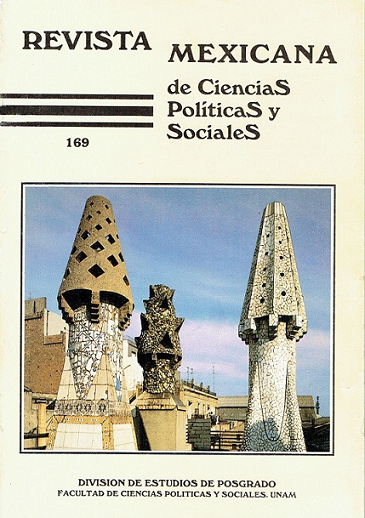Consumiendo desde el consenso. Una exploración sobre el proceso de trabajo y la política
Main Article Content
Abstract
Downloads
Article Details
Citas en Dimensions Service
References
Arendt, H., La condición humana, Barcelona, Paidós, 1993.
Arendt, H., “Labor, trabajo y acción, Una conferencia (circa 1957)”, en De la historia a la acción, Barcelona, Paidós, 1995, pp. 89- 108.
Attali, J., Historias del tiempo, México, Fondo de Cultura Económica, 1985.
Avaro, D., “Durkheim y el capitalismo organizado: el desarrollo de un problema”, en C. Peón, A. Roslery D. Avaro, Estudios de sociología política: M. Weber, E. Durkheim, y F. Tónnies, Buenos Aires, Centro Editor de América Latina, 1993, pp. 47-93.
Avaro, D., “Explotación y justicia”, Documento de trabajo, DT3, México, UNAM, Facultad de Filosofía y Letras, División de Estudios de Posgrado, 1996a.
Avaro, D., “Excavando entre las minas. Cuatro lecciones propositivas sobre el socialismo de mercado”, México, Facultad de Ciencias Políticas y Sociales, UNAM, 1996b, mimeografiado.
Berman, M., Todo lo sólido se desvanece en el aire, México, Siglo XXI Editores, 1989.
Booth, W.J., “Economics of time. On the idea of time in Marx’s political economy”, Ethics, vol. 19, núm. 1, 1991, pp. 7-27.
Braverman, H., Trabajo y capital monopolista, México, Nuestro Tiempo, 7ma. ed., 1984.
Burawoyn, M., “Toward a marxist theory of the labor process: braverman and beyond”, Politics & Society, vol. 8, núms. 3-4, 1978, pp. 274-312.
Burawoyn, M., Manufacturing consent. Changes in the labor process under monopoly capitalism, Chicago, Chicago University Press, 1979.
Coriat, B., “Incentives, bargaining and trust: alternative scenarios for the future of work”, International Contributions to Labour Studies, núm. 5, 1995, pp. 131-151.
Gorz, A., Métamorphoses du travail : enquête du sens, París, Galilée,
Guidieri, R., “Babel”, en La abundancia de los pobres, México, Fondo de Cultura Económica, 1989, pp. 9-22.
Ring, J., “On needing both Marx and Arendt. Alienation and the flight from inwardness”, Political Theory, vol. 14, núm. 3, 1989, pp. 432-448.
Tezanos, J., “Transformaciones en la estructura de clases en las sociedades tecnológicas avanzadas”, El socialismo del futuro, núm. 6, 1992, pp. 65-85.
Thompson, E., The making of the English working class, Harmondsworth, Penguin, 1968.
Thompson, E., “Tiempo, disciplina de trabajo y capitalismo industrial”, en
Tradición, revuelta y conciencia de clase, Barcelona, Crítica, 3a. ed., 1989.

La Revista Mexicana de Ciencias Políticas y Sociales publicada por la Universidad Nacional Autónoma de México se distribuye bajo una Licencia Creative Commons Atribución-NoComercial-SinDerivar 4.0 Internacional.
Basada en una obra en http://www.revistas.unam.mx/index.php/rmcpys/
La RMCPyS autoriza a sus colaboradores que suban una copia de sus trabajos publicados en sus webs personales o en cualquier repositorio de acceso abierto, siempre y cuando se mencione específicamente a la Revista Mexicana de Ciencias Políticas y Sociales como fuente original de procedencia, citando el año y número del ejemplar respectivo y añadiendo el enlace a la página web donde este órgano editorial puede ser consultado in toto, de manera abierta y gratuita en: <www.revistas.unam.mx/index.php/rmcpys>.
Las y los lectores tienen libertad para:
Compartir, copiar y redistribuir el material en cualquier medio o formato.
El licenciante no puede revocar estas libertades en tanto usted siga los términos de la licencia.
De acuerdo con los siguientes términos:
- Atribución: la/el lector/a debe reconocer el crédito de una obra de manera adecuada, proporcionar un enlace a la licencia, e indicar si se han realizado cambios. Puede hacerlo en cualquier forma razonable, pero no de forma tal que sugiera que tiene el apoyo del licenciante o lo recibe por el uso que hace.
- No comercial: la/el lector/a no puede hacer uso del material con fines comerciales.
- Si se mezcla, transforma o se desarrolla a partir de la obra licenciada, no se permite la distribución del material modificado.
Cargos por gestión de artículos
La Revista Mexicana de Ciencias Políticas y Sociales NO cobra tarifas por recibir, procesar o publicar los artículos (Article Processing Charge [APC]) enviados por los autores.





